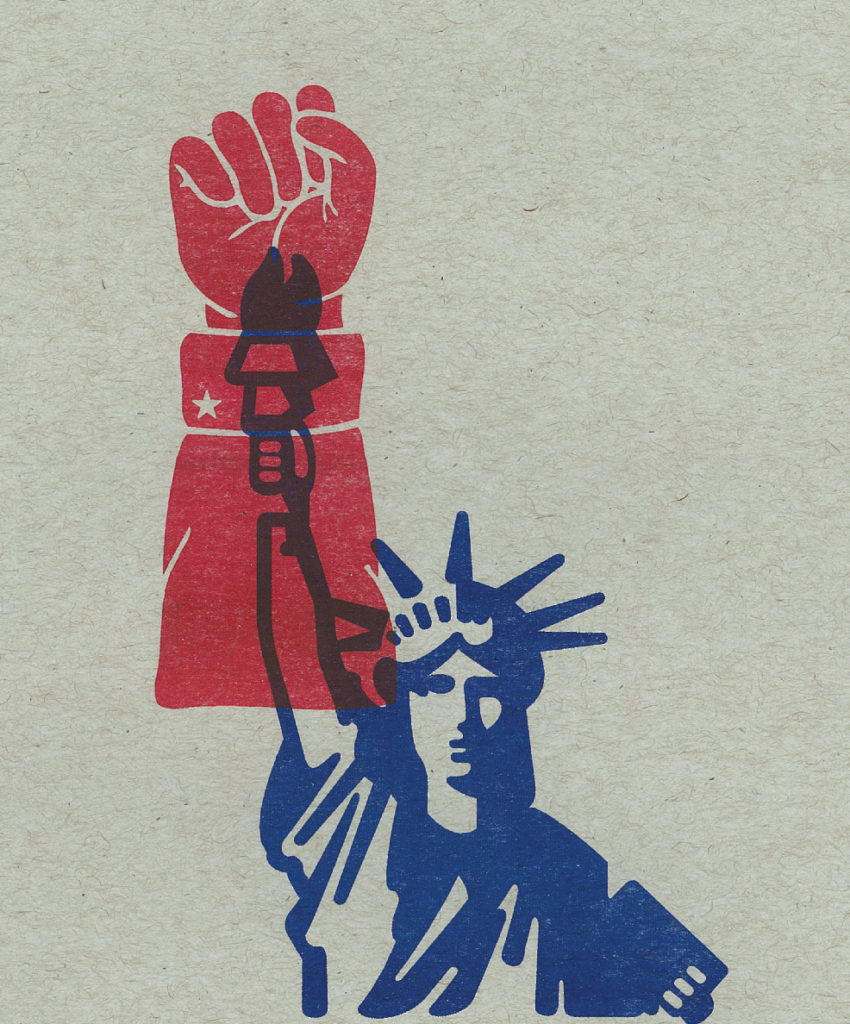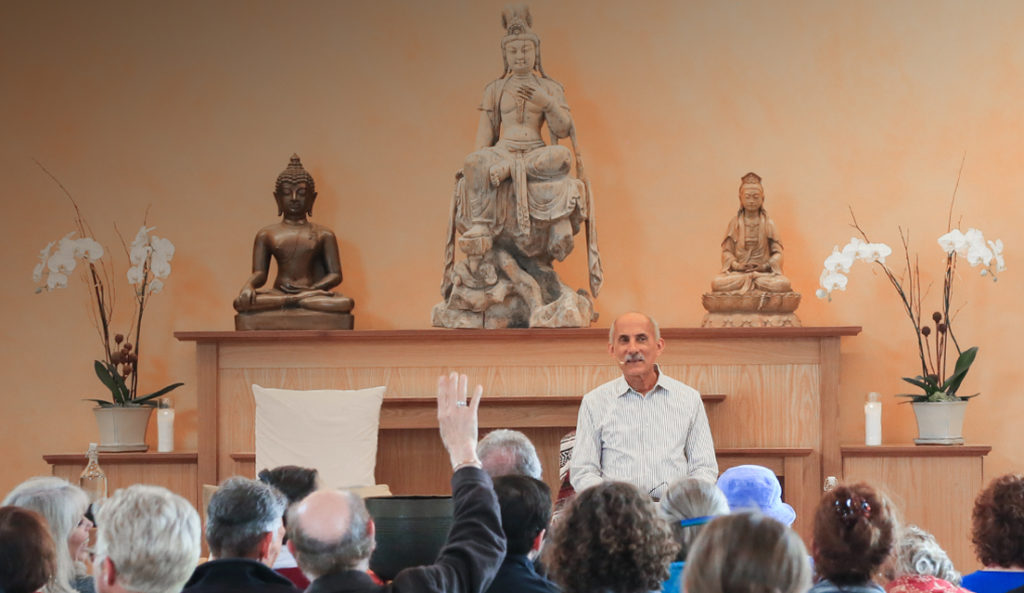Steps We Can All Take to Eliminate Racial Inequity
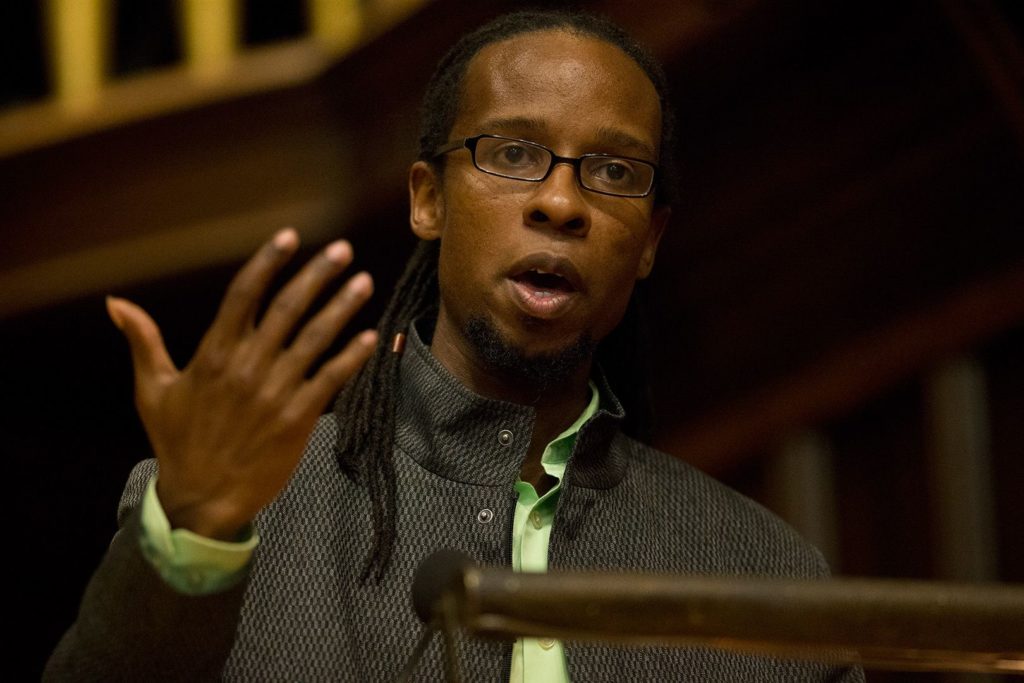
I’m meeting today with one of the White Awake discussion groups I’ve been leading and we’ll be talking about How to be an Antiracist, by Ibram X. Kendi (which I highly recommend — along with his previous book Stamped from the Beginning: the Definitive History of Racist Ideas in America.)
Of his research into the history of racism Kendi writes, “Over time, the source of racist ideas became obvious, but I had trouble acknowledging it. The source did not fit my conception of racism, my racial ideology, my racial identity. I became a college professor to educate away racist ideas, seeing ignorance as the source of racist ideas, seeing racist ideas as the source of racist policies, seeing mental change as the principal solution, seeing myself, an educator, as the primary solver…
“My research kept pointing me to the same answer: The source of racist ideas was not ignorance and hate, but self-interest.
“The history of racist ideas is the history of powerful policymakers erecting racist policies out of self-interest, then producing racist ideas to defend and rationalize the inequitable effects of their policies, while everyday people consume those racist ideas, which in turn sparks ignorance and hate…
“Racist policies,” Kendi writes, “lead to racist ideas, not the other way around, as we have commonly thought. We must eliminate racist policies if we ever hope to eliminate racist ideas.”
To that end, Kendi has founded the Antiracist Research and Policy Center in Washington, D.C., where he envisions bringing together teams of scholars, policy experts, journalists, and advocates to focus on the most critical and seemingly intractable racial inequities.
He writes, “These teams would model some of the steps we can all take to eliminate racial inequity in our spaces:
- Admit racial inequity is a problem of bad policy, not bad people.
- Identify racial inequity in all its intersections and manifestations.
- Investigate and uncover the racist policies causing racial inequity.
- Invent or find antiracist policy that can eliminate racial inequity.
- Figure out who or what groups has the power to institute antiracist policy.
- Disseminate and educate about the uncovered racist policy and antiracist policy correctives.
- Work with sympathetic antiracist policymakers to institute the antiracist policy.
- Deploy antiracist power to compel or drive from power the unsympathetic racist policymakers in order to institute the antiracist policy.
- Monitor closely to ensure the antiracist policy reduces and eliminates racial inequity.
- When policies fail, do not blame the people. Start over and seek out new and more effective antiracist treatments until they work.
- Monitor closely to prevent new racist policies from being instituted.
More to Wake Up to
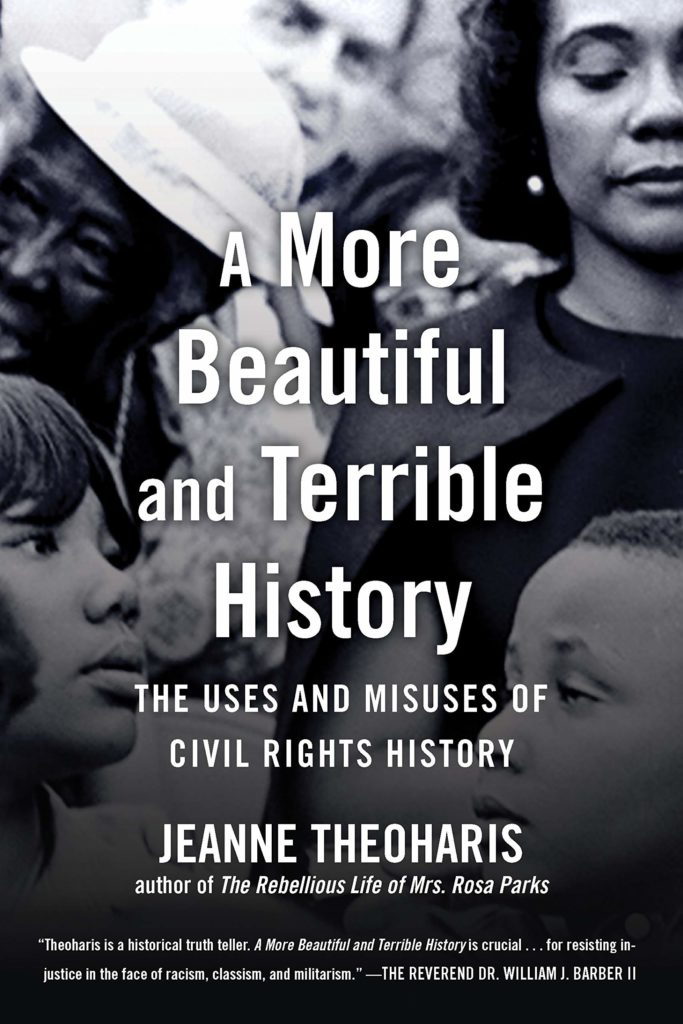 After reading Jeanne Theoharis’ sobering op-ed in the New York Times, What King Said About Northern Liberalism, my CDL Waking Up to Whiteness group has selected for our next discussion Theoharis’ A More Beautiful and Terrible History: The Uses and Misuses of Civil Rights History.
After reading Jeanne Theoharis’ sobering op-ed in the New York Times, What King Said About Northern Liberalism, my CDL Waking Up to Whiteness group has selected for our next discussion Theoharis’ A More Beautiful and Terrible History: The Uses and Misuses of Civil Rights History.
From the publisher: “The civil rights movement has become national legend, lauded by presidents from Reagan to Obama to Trump, as proof of the power of American democracy.
“This fable, featuring dreamy heroes and accidental heroines, has shuttered the movement firmly in the past, whitewashed the forces that stood in its way, and diminished its scope. And it is used perniciously in our own times to chastise present-day movements and obscure contemporary injustice.
“In A More Beautiful and Terrible History award-winning historian Jeanne Theoharis dissects this national myth-making, teasing apart the accepted stories to show them in a strikingly different light.”
***
I expect this will not be an easy read, but I feel ready for it. How about you?
Doing What Needs to be Done Today
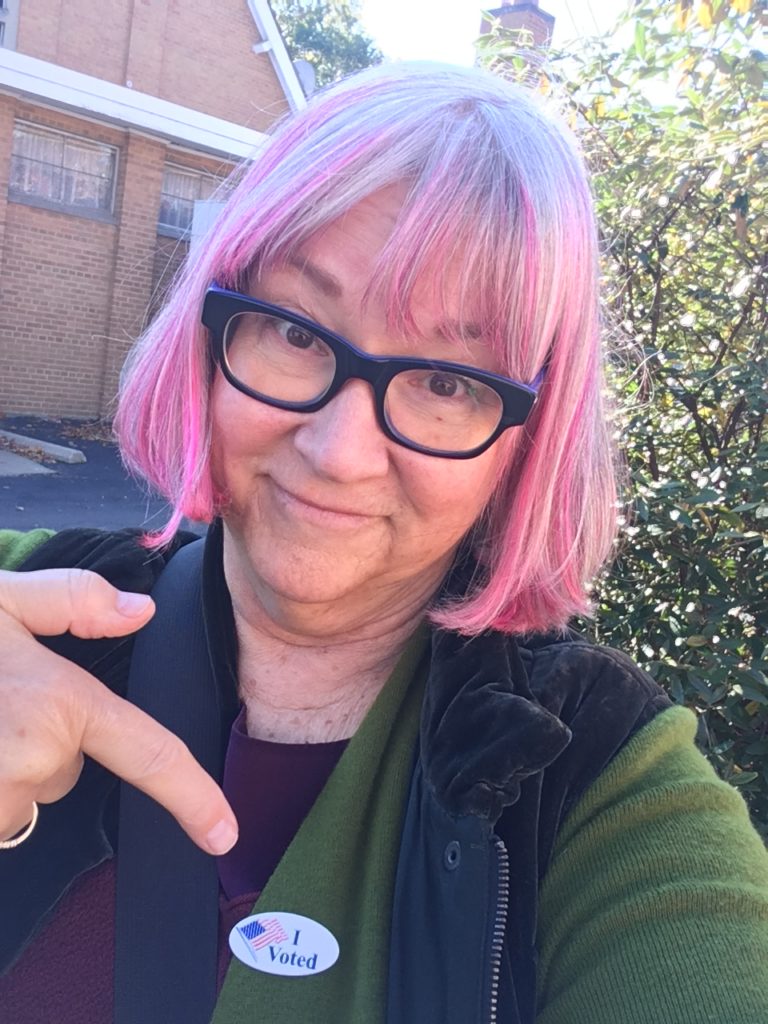 No matter what happens tonight, more will need to be done tomorrow.
No matter what happens tonight, more will need to be done tomorrow.
But that’s for tomorrow.
Today: we vote.
I’m Optimistic
“Those who benefit from the status quo are perfectly happy for us to think nothing is going to get any better.
“In fact, these days, cynicism is obedience.”
— Alex Steffen,
The Bright Green City
Don’t Go Back to Sleep
from Rumi:
The breeze at dawn has secrets to tell you.
Don’t go back to sleep.
You must ask for what you really want.
Don’t go back to sleep.
People are going back and forth across the doorsill
between two worlds, which touch.
The door is round and open.
Don’t go back to sleep.
***
from me:
The election is twelve days away.
Don’t go back to sleep.
And then from Here….
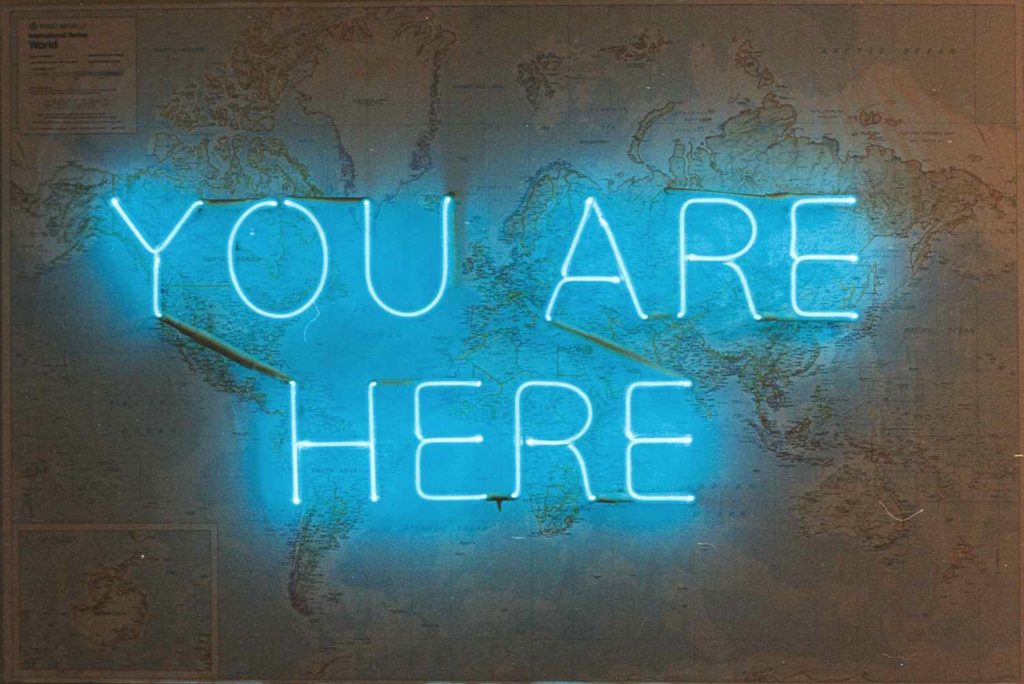 From Duties of Heedfulness, a talk by Ajahn Sucitto:
From Duties of Heedfulness, a talk by Ajahn Sucitto:
“Whenever you feel yourself getting pulled, that’s the most important time for you to pause. And you can pause for just something like twenty seconds, or a minute, and ask: Where am I now?
“Not: What should I do?
“But: Where am I now?
“You may say, I’m in a restaurant. I’m in an office.
“No, that’s just what it looks like. That’s what your eyes can see. That’s what your thinking mind can tell you.
“The question is: Where do you feel your presence? Where is your presence now?
“Presence is a sense of firmness, of stability. It’s always here. And it’s always being dissipated into the sense fields. So when I say: Where are you now, it’s not really asking for a verbal response, it’s just pointing to the quality of the citta — Awareness as Presence.
“We can notice the trembling, or the questioning or the feelings or sensations… They’re all moving and changing… Meanwhile, as one is acknowledging the moving and changing, what is it that acknowledges the moving and changing?
“Presence. The sense of presence, of citta, as a simple quality of being…
“Within this realm of sights and sounds and thoughts and energies and emotions and pushes and pulls and moods and impressions…. Presence is Here.
“Take your time with that.
“This is Being. Being is always exactly the same. Being doesn’t change in time. Being is not the person. Being is not the moods. Being is not the thoughts. Being is not the activities.
“Being is just being — Here. And that’s a refuge. That’s an island, in the middle of the stream. That’s an island in the middle of the flood. And you can return to that.
And then from Here: What’s useful? What’s important? What is the most skillful thing to do, at this particular time?”
***
Yes, what indeed!
Tomorrow is the last day for Missouri residents to register to vote in the November 6th election. Are you registered? Want to check, just to make sure? Go to vote.org.
And then keep on going from there.
Do Not Ignore…
 Note: The following was previously published as a Full Moon Reflection by the Forest Sangha on August 26:
Note: The following was previously published as a Full Moon Reflection by the Forest Sangha on August 26:
Do not ignore the effects of evil,
saying, “This will come to nothing”.
Just as by the gradual fall of raindrops
the water jar is filled,
so in time fools are corrupted by evil-doing.(Dhammapada v. 121)
“It is wise to remind ourselves that we usually don’t see how habits are formed. Perhaps we think that it doesn’t matter when we turn a blind eye to somebody else’s unethical conduct. But after a few times of choosing to ‘not notice’ what’s going on, we can find that we have grown used to such conduct – we’ve become somewhat insensitive.
“A more skilful approach is to fully register how witnessing abuse or corruption affects us, in the whole body-mind, and to study our reactions. It is appropriate to feel averse towards that which is improper; aversion only turns into hatred when we cling to it, when we identify with it.
“Hatred is always to be avoided and never to be acted upon, but let’s not be so afraid of it that we become blind. We must protect our sensitivity, feel fully what we feel, and learn to not ‘become’ those feelings.”
Want to Know How You Can Help?
I’m posting this today (on National Voter Registration Day) in case you haven’t already receive an email message from Jack Kornfield or one of the other 130 or more Buddhist teachers (see below) who are asking for your help in getting folks registered to vote (starting with yourself, of course!) in advance of the important election coming up in November.
***
“As long as followers of the Way gather together and meet in harmony can they be expected to prosper and not decline. As long as followers of the Way care for the vulnerable among them can they be expected to prosper and not decline. As long as followers of the Way tend the sacred places in their environment can they be expected to prosper and not decline.” ~ MahaParinirvana Sutra
Dear Friends in the Dharma,
This is a critical time in American society. As Buddhist teachers and leaders we recognize the importance of all who are eligible to participate in decisions that affect the well being of the whole. A mutual caring community is one of the central teachings of the Buddha.
Many have wondered what you can do at this divisive time. Across the country, tens of millions of eligible voters do not cast their vote – often because they don’t believe their voice matters!
We are joining together with Faith In Action, a NON PARTISAN group of churches, mosques, synagogues and faith communities to help make sure all who are eligible are supported to vote.
We joyfully encourage all in our communities who can help in these weeks ahead to connect with Faith in Action by clicking this LINK. There you will find support and training so that in your area you can help get people out to vote.
Express your commitment and respect for the innate dignity and worth of all. Help to empower the voice of the whole community as a truly important contribution.
You can really make a difference! Please join us.
With loving kindness, compassion and blessings,
Yours in the Dharma,
| Jack Kornfield Sharon Salzberg Joseph Goldstein Zoketsu Norman Fischer David Loy Sayadaw U Vivekananda Lama Surya Das Lama Palden Alioto Thanissara & Kittisaro Trudy Goodman Bob Thurman William Aiken Chozen & Hogen Bays Rev. Bup Hee Lama Willa Miller Oren Jay Sofer Marcia Rose Neesha Patel Tara Mulay Rodney Smith Pamela Weiss Sharda Rogell Kamala Masters Jill Shepherd Bonnie Duran James Baraz Devin Berry Anna Douglas Spring Washum Carol Wilson Larry Yang Kate Lila Wheeler Susie Harrington Wes Nisker Eugene Cash Chris Crotty Dawn Mauricio Gulwinder S. Singh Tempel R. Smith Parwan Bareja Phillip Moffitt Noliwe Alexander Andrea Castillo Tere Abdala Andrea Fella Jim Willems Mitchell Ratner Eiko Joshin Carolyn Atkinson Karl Brunnholzl Kate Johnson Melissa Myōzen Blacker, Rōshi Arinna Weisman Jules Shuzen Harris Sensei James Myosan Cordova, Sensei Alexis Santos Rev. Edward Keido Sanshin Oberholtzer John Tarrant, Roshi Kanzan Bruce Fortin Thanissara Jundo Cohen Pamela Ayo Yetunde Gyokuko Carlson Rev. Ronald Kobata |
| Tara Brach Wendy Egyoku Nakao Gil Fronsdal Kenjitsu Nakagaki Bhante Katugastota Uparatana Nayaka Thera Sylvia Boorstein Sojun Mel Weitsman Judy Lief Hozen Alan Senauke Gina Sharpe Konda Mason Dharmacarani Vimalasara Barbara Gates Bhiksuni Thubten Chodron Jeff Haozous Mary Grace Orr Lama Döndrup Howard Cohn Pat Berube, Lama Pat Lama Stephen Gross Leslie Booker Matthew Brensilver Kate Johnson Diana Winston Debra Chamberlin Taylor Lynn Weinberger Erin Treat Erin Selover, MS Shastri Nick Kranz Madeline Klyne Daniel Rothberg Devon Hase Chris Cullen Melvin McLeod Adin Strauss Furyu Schroeder Annik Brunet Rev. Tenzen David Zimmerman DaRa Williams Gregory Scharf Anne Cushman Valorie Hutson Ruth King Karen Maezen Miller Rev. James Ishmael Ford Rev. Sumi Loundon Kim Ed Sattizahn Karma Lekshe Tsomo Rev. Grace Schireson Sensei Koshin Paley Ellison Sensei Chodo Campbell Jisan Tova Green Rev. Rosan O. Yoshida, Ph.D. Layla Smith Bockhorst Eihei Peter Levitt Rebecca Li Myogen Kathryn Stark Narayan Helen Liebenson Flint Sparks Harrison Blum Sebene Selassie Shaku Kengu |
There Will Come a Time
 This is what I have learned from working with my dharma friends on Waking Up to Whiteness: It’s necessary to recognize the reality of racism; it’s important to want racism to end.
This is what I have learned from working with my dharma friends on Waking Up to Whiteness: It’s necessary to recognize the reality of racism; it’s important to want racism to end.
But it won’t end until: “I’m not a racist,” turns into: “I’m antiracist. Antiracism is one of my core values. My actions in the world are based on that.”
In support of which, I offer this except from Stamped from the Beginning: The Definitive History of Racist Ideas in America, by Ibram X. Kendi:
“An antiracist America can only be guaranteed if principled antiracists are in power, and then antiracist policies become the law of the land, and then antiracist ideas become the common sense of the people, and then the antiracist common sense of the people holds those antiracist leaders and policies accountable.
“And that day is sure to come. No power lasts forever. There will come a time when Americans will realize that the only thing wrong with Black people is that they think something is wrong with Black people.
“There will come a time when racist ideas will no longer obstruct us from seeing the complete and utter abnormality of racial disparities. There will come a time when we will love humanity, when we will gain the courage to fight for an equitable society for our beloved humanity, knowing, intelligently, that when we fight for humanity, we are fighting for ourselves.
“There will come a time. Maybe, just maybe, that time is now.”
***
I am committed to that.

